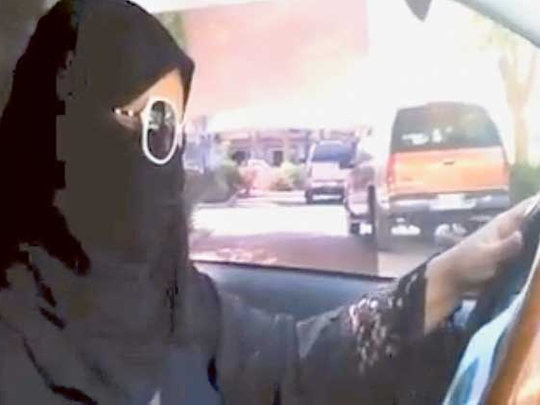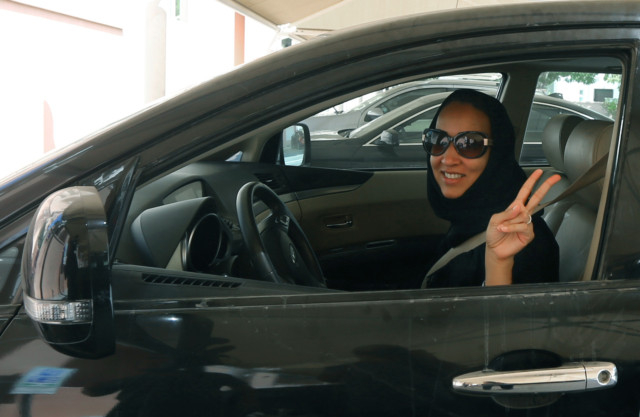
Riyadh: A Saudi woman said she got behind the wheel Saturday and drove to the grocery store without being stopped or harassed by police, kicking off a campaign protesting the ban on women driving in the conservative kingdom.
Despite warnings by police and conservatives in the kingdom against defying the ban, at least four women have successfully driven, Mai Al Sawyan said.
Though no specific Saudi law bans women from driving, women are not issued licences. Powerful clerics who hold far-reaching influence over the kingdom’s ruling monarchy enforce the ban. Clerics warn that “licentiousness” will spread if women drive.
In the run-up to the campaign, police warned that anyone disturbing public order would be dealt with forcefully.
Clerics also protested earlier in the week against the online petition campaign, which was launched in late September and says it has more than 16,000 signatures.
The account’s website, oct26driving.org, and official English language YouTube account were hacked on Friday, according to activists.
Activists posted a four minute-long video on the campaign’s official Arabic account that they said depicted Al Sawyan driving in Riyadh. She wore sunglasses and her hair was covered by the traditional black headscarf worn by Saudi women, but her face was otherwise visible.
Like other female drivers defying the ban in Saudi Arabia, Mai said she has obtained a driver’s licence from abroad.
“I am very happy and proud that there was no reaction against me,” she told The Associated Press by telephone.
“There were some cars that drove by. They were surprised, but it was just a glance. It is fine ... They are not used to seeing women driving here.”
However, Mai said she was prepared for the risk of detention if caught. She said she was far enough from a police car that she was not spotted.
“I just took a small loop. I didn’t drive for a long way, but it was fine. I went to the grocery store,” she said.
Her husband and family waited at home and called her nervously when she arrived at the grocery store to check on her, she said. She drove with a local female television reporter in the car. They were both without male relatives in the vehicle.
The campaign for women to drive is a rare show of defiance in the kingdom.
The kingdom’s first major driving protest came in 1995. Some 50 women who drove their cars were jailed for a day, had their passports confiscated and lost their jobs. In June 2011, about 40 women got behind the wheel in several cities in a protest sparked when a woman was arrested after posting a video of herself driving.
Earlier, several women said they had received telephone calls from the interior ministry, which warned of measures against activists who chose to participate and asked them to promise not to drive on Saturday.
“It is known that women in Saudi are banned from driving and laws will be applied against violators and those who demonstrate in support” of this cause, ministry spokesman General Mansour Al Turki told AFP
On Wednesday, the ministry said it would act against anyone who attempts to “disturb public peace” by congregating or marching “under the pretext of an alleged day of female driving”.
In remarks to the Al Hayat daily published on Friday, Al Turki even warned against supporting the campaign online.
Activists have repeatedly insisted that no demonstrations will be held in the absolute monarchy, which officially bans public gatherings.
Amnesty International has denounced the threats, while Human Rights Watch called for an end to discrimination.
Saeed Boumedouha, Amnesty’s acting Middle East and North Africa programme director, said Saudi authorities “continue to harass and intimidate women activists”.
“This has included phone call and online threats, arbitrary travel bans and detentions, forcing activists and their family members to sign pledges not to drive and using the state-controlled media to discredit activists.”
London-based Amnesty said “the ban and the ongoing scare tactics to maintain it are out of step with the modern world, and characteristic of the wider discrimination that crushes women’s freedom and besmirches the kingdom’s reputation”.
The UN Human Rights Council has also urged Saudi Arabia to end discrimination against women, among other rights abuses.











